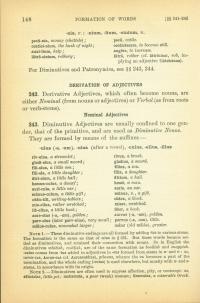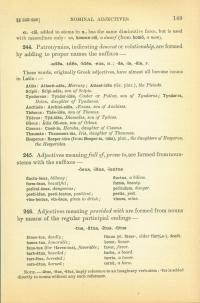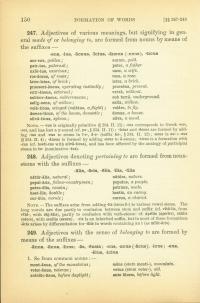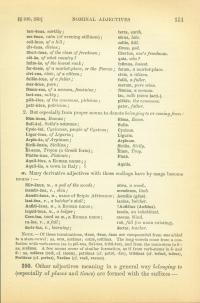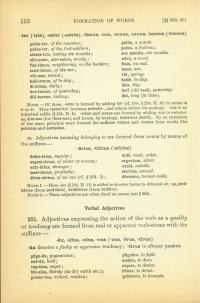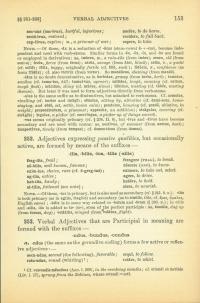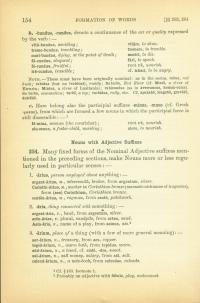242. Derivative Adjectives, which often become nouns, are either Nominal (from nouns or adjectives) or Verbal (as from roots or verb stems).
Nominal Adjectives
243. Diminutive Adjectives are usually confined to one gender, that of the primitive, and are used as Diminutive Nouns.
They are formed by means of the suffixes -ulus (-a, -um), -olus (after a vowel), -culus, -ellus, -illus
| rīv-ulus a streamlet | rīvus a brook |
| gladi-olus a small sword | gladius a sword |
| fīli-olus a little son | fīlius a son |
| fīli-ola a little daughter | fīlia a daughter |
| ātri-olum a little hall | ātrium a hall |
| homun-culus a dwarf | homō a man |
| auri-cula a little ear | auris an ear |
| mūnus-culum a little gift | mūnus a gift [n.] |
| cōdic-illī writing-tablets | cōdex a block |
| mis-ellus rather wretched | miser wretched |
| lib-ellus a little book | liber a book |
| aure-olus (-a, -um) golden | aureus (-a, -um) golden |
| parv-olus (later parv-ulus) very small | parvus (-a, -um) little |
| mâius-culus somewhat larger | mâior (old mâiōs) greater |
Note 1— These diminutive endings are all formed by adding -lus to various stems. The formation is the same as that of -ulus in § 251 (below). But these words became settled as diminutives, and retained their connection with nouns. So in English the diminutives whitish, reddish, bookish and snappish. -culus -lus added to adjectives in -cus formed from stems in n- and s-:
iuven-cus
Aurun-cus (cf. Aurunculêius)
prīs-cus
whence the -cu- becomes a part of the termination, and the whole ending (-culus) is used elsewhere, but mostly with n- and s- stems, in accordance with its origin.
Note 2— Diminutives are often used to express affection, pity, or contempt.
dēliciolae little pet
muliercula a poor (weak) woman
Graeculus a miserable Greek
a. -ciō, added to stems in n-, has the same diminutive force, but is used with masculines only.
homun-ciō a dwarf (from homō a man)
244. Patronymics, indicating descent or relationship, are formed by adding the suffixes -adēs,-idēs, -īdēs, -eus [m.], -ās, -is, -ēis [f.], to proper names
These words, originally Greek adjectives, have almost all become nouns in Latin.
Atlās: Atlanti-adēs Mercury;
Atlant-idĕs (Greek plural) the Pleiads
Scīpiō: Scīpi-adēs son of Scipio
Tyndareus: Tyndar-idēs Castor or Pollux, son of Tyndarus
Tyndar-is Helen, daughter of Tyndarus
Anchīsēs: Anchīsi-adēs Æneas, son of Anchises
Thēseus: Thēs-īdēs son of Theseus
Tȳdeus: Tȳd-īdēs Diomedes, son of Tydeus
Oīleus: Âiāx Oīl-eus son of Oileus
Cisseus: Cissē-is Hecuba, daughter of Cisseus
Thaumās: Thaumant-iās Iris, daughter of Thaumas
Hesperus: Hesper-ides (from Hesper-is, -idis), pl.
the daughters of Hesperus, the Hesperides
245. Adjectives meaning full of, prone to , are formed from noun stems with the suffixes -ōsus, -lēns, lentus
| fluctu-ōsus billowy | fluctus a billow |
| form-ōsus beautiful | forma beauty |
| perīcul-ōsus dangerous | perīculum danger |
| pesti-lēns, pesti-lentus pestilent | pestis pest |
| vīno-lentus vīn-ōsus given to drink | vīnum wine |
246. Adjectives meaning provided with are formed from nouns by means of the regular participial endings -tus, -ātus, -ītus, ūtus
| fūnes-tus deadly | fūnus (stem fūner-, older fūne/os-) death |
| hones-tus honorable | honor honor |
| faus-tus (for †faves-tus) favorable | favor favor |
| barb-ātus bearded | barba a beard |
| turr-ītus turreted | turris a tower |
| corn-ūtus horned | cornū a horn |
Note— -ātus, -ītus, -ūtus, imply reference to an imaginary verb stem; -tus is added directly to nouns without any such reference.
247. Adjectives of various meanings, but signifying in general made of or belonging to, are formed from nouns by means of the suffixes -eus, -ius,
-āceus, -īcius, āneus (-neus), -ticus
| aur-eus golden | aurum gold |
| patr-ius paternal | pater a father |
| uxōr-ius uxorious | uxor a wife |
| ros-āceu of roses | rosa a rose |
| later-īcius of brick | later a brick |
| praesent-āneus operating instantly | praesēns present |
| extr-āneus external | extrā without |
| subterr-āneus subterranean | sub terrā underground |
| salīg-neus of willow | salix willow |
| volā-ticus winged (volātus a flight) | volāre to fly |
| domes-ticus of the house, domestic | domus a house |
| silvā-ticus sylvan | silva a wood |
Note— -ius is originally primitive (§ 234.2.11); -eus corresponds to Greek -ειος, -εος, and has lost a y sound (cf. yo-, § 234.2.11); -īcius and -āceus are formed by adding -ius and -eus to stems in ī-c-, ā-c- (suffix ko-, § 234.2.12); -neus is no- + -eus (§ 234.2.4); -āneus is formed by adding -neus to ā- stems; -ticus is a formation with
-cus (cf. hosti-cus with silvā-ticus), and has been affected by the analogy of participial stems in to- (Nominative -tus).
248. Adjectives denoting pertaining to are formed from noun stems with the suffixes ālis, āris, ēlis, īlis, ūlis
| nātūr-ālis natural | nātūra nature |
| popul-āris fellow-countryman | populus a people |
| patru-ēlis cousin | patruus uncle |
| host-īlis hostile | hostis an enemy |
| cur-ūlis curule | currus a chariot |
Note— The suffixes arise from adding -lis (stem li-) to various vowel stems. The long vowels are due partly to confusion between stem and suffix (cf. vītā-lis, from vītā-, with rēg-ālis), partly to confusion with verb stems.
Aprīlis (aperīre)
edūlis (edere)
senīlis (senex)
-ris is an inherited suffix, but in most of these formations -āris arises by differentiation for -ālis in words containing an l (as mīlit-āris).
249. Adjectives with the sense of belonging to are formed by means of the suffixes -ānus, -ēnus, -īnus; -ās, -ēnsis; -cus, -acus (-ācus), -icus;
-eus, -êius, -icius
1. So from common nouns:
| mont-ānus of the mountains | mōns (stem monti-) mountain |
| veter-ānus veteran | vetus (stem veter-) old |
| antelūc-ānus before daylight | ante lūcem before light |
| terr-ēnus earthly | terra earth |
| ser-ēnus calm (of evening stillness) | sērus late |
| coll-īnus of a hill | collis hill |
| dīv-īnus divine | dīvus god |
| lībert-īnus of the class of freedmen | lībertus one's freedman |
| cûi-ās of what country? | quis who? |
| īnfim-ās of the lowest rank | īnfimus lowest |
| for-ēnsis of a marketplace, or the Forum | forum a marketplace |
| cīvi-cus civic, of a citizen | cīvis a citizen |
| fullōn-icus of a fuller | fullōa fuller |
| mer-ācus pure | merum pure wine |
| fēmin-eus of a woman, feminine | fēmina a woman |
| lact-eus milky | lac milk (stem lacti-). |
| plēb-ēius of the commons, plebeian | plēbēs the commons |
| patr-icius patrician | pater father |
2. But especially from proper nouns to denote belonging to or coming from :
| Rōm-ānus Roman | Rōma Rome |
| Sull-ānī Sulla's veterans | Sulla |
| Cyzic-ēnī Cyzicenes, people of Cyzicus | Cyzicus |
| Ligur-īnus of Liguria | Liguria |
| Arpīn-ās of Arpinum | Arpīnum |
| Sicili-ēnsis Sicilian | Sicilia Sicily |
| Īli-acus Trojan (a Greek form) | Īlium Troy |
| Platōn-icus Platonic | Platō |
| Aquil-êius (a Roman name) Aquil-êia (a town in Italy) |
Aquila |
a. Many derivative adjectives with these endings have by usage become nouns.
| Silv-ānus a god of the woods [m.] | silva a wood |
| membr-āna skin [f.] | membrum limb |
| Aemili-ānus name of Scipio Africanus [m.] | Aemilia (gēns) |
| lani-ēna a butcher's stall [f.] | lanius butcher |
| Aufidi-ēnus a Roman name [m.] | †Aufidius (Aufidus) |
| inquil-īnus a lodger [m.] | incola an inhabitant |
| Caec-īna a Roman name, used as [m.] | caecus blind |
| ru-īna a fall [f.] | ruō fall (no noun existing) |
| doctr-īna learning [f.] | doctor teacher |
Note— Of these terminations, -ānus, -ēnus, -īnus are compounded from -nus added to a stem-vowel.
arca, arcānus
collis, collīnus
The long vowels come from a confusion with verb stems (as in plē-nus, fīnī-tus, tribū-tus), and from the noun stem in ā-.
arcānus
A few nouns occur of similar formation, as if from verb stems in ō- and ū-.
colōnus (colō, cf. incola)
patrōnus (cf. patrō, -āre)
tribūnus (cf. tribuō, tribus)
Portūnus (cf. portus)
Vacūna (cf. vacō, vacuus)
250. Other adjectives meaning in a general way belonging to (especially of places and times ) are formed with the suffixes -ter (-tris), -ester
(-estris), -timus, -nus, -ernus, -urnus, ternus (-turnus)
| palūs-ter of the marshes | palūs a marsh |
| pedes-ter of the foot-soldiers | pedes a footman |
| sēmēs-tris lasting six months | sex mēnsēs six months |
| silv-ester, silv-estris woody | silva a wood |
| fīni-timus neighboring, on the borders | fīnis an end |
| mari-timus of the sea | mare sea |
| vēr-nus vernal | vēr spring |
| hodi-ernus of today | hodiē today |
| di-urnus daily | diēs day |
| hes-ternus of yesterday | herī (old hesī) yesterday |
| diū-turnus lasting | diū long (in time) |
Note— Of these, -ester is formed by adding tri- (cf. tro-, § 234.2.16) to stems in t- or d-. Thus †pedet-tri- becomes pedestri-, and others follow the analogy. -nus is an inherited suffix (§ 234.2.4). -ernus and -urnus are formed by adding -nus to s- stems:
diur-nus (for †dius-nus)
and hence, by analogy
hodiernus (hodiē)
By an extension of the same principle were formed the suffixes -ternus and -turnus from words like paternus and nocturnus.
a. Adjectives meaning belonging to are formed from nouns by means of the suffixes ārius, -tōrius (sōrius)
| ōrdin-ārius regular | ōrdō rank, order |
| argent-ārius of silver or money | argentum silver |
| extr-ārius stranger | extrā outside |
| meri-tōrius profitable | meritus earned |
| dēvor-sōrius of an inn (cf. § 254.5) | dēvorsus turned aside |
Note 1— Here -ius (§ 234.2.11) is added to shorter forms in -āris and -or
pecūliārius (from pecūliāris)
bellātōrius (from bellātor).
Note 2— These adjectives are often fixed as nouns (see § 254).
Verbal Adjectives
251. Adjectives expressing the action of the verb as a quality or tendency are formed from real or apparent verb stems with the suffixes āx, idus, ulus, vus (uus, īvus, tīvus). -āx denotes a faulty or aggressive tendency;
-tīvus is oftener passive.
| pūgn-āx pugnacious | pūgnāre to fight |
| aud-āx bold | audēre to dare |
| cup-idus eager | cupere to desire |
| bib-ulus thirsty (such as dry earth, etc.) | bibere to drink |
| proter-vus violent, wanton | prōterere to trample |
| noc-uus (noc-īvus) hurtful, injurious | nocēre to do harm |
| recid-īvus restored | recidere to fall back |
| cap-tīvus captive, a prisoner of war [m.] | capere to take |
Note— Of these, -āx is a reduction of -ācus (stem vowel ā- + -cus), become independent and used with verb stems. Similar forms in -ĕx, -ōx, -īx, and -ūx are found or employed in derivatives.
imbrex a rain-tile [m.] (from imber)
senex old (from seni-s)
ferōx fierce (ferus)
atrōx savage (āter black)
celōx a yacht [f.] (cf. cellō)
fēlīx happy, originally fertile (cf. fēlō suck)
fīdūcia confidence (as from †fīdūx)
cf. also victrīx (from victor). So mandūcus chewing (from mandō).
-idus is no doubt denominative.
herbidus grassy (from herba herb)
tumidus swollen (cf. tumu-lus hill; tumul-tus uproar)
callidus tough, cunning (cf. callum tough flesh)
mūcidus slimy (cf. mūcus slime)
tābidus wasting (cf. tābēs wasting disease)
But later it was used to form adjectives directly from verb stems.
-ulus is the same suffix as in diminutives, but attached to verb stems.
Cf. aemulus rivaling (cf. imitor and imāgō)
sēdulus sitting by, attentive (cf. domi-seda homestaying, and sēdō set, settle, hence calm)
pendulus hanging (cf. pondō, ablative, in weight; perpendiculum, a plummet; appendix an addition)
strāgulus covering (cf. strāgēs)
legulus a picker (cf. sacri-legus a picker up of things sacred)
-vus seems originally primary (cf. § 234.2.8), but -īvus and -tīvus have become secondary and are used with nouns.
aestīvus of summer (from aestus heat)
tempestīvus timely (from tempus)
cf. domes-ticus (from domus).
252. Adjectives expressing passive qualities, but occasionally active, are formed by means of the suffixes -ilis, -bilis, -ius, -tilis (-silis)
| frag-ilis frail | frangere (FRAG) to break |
| nō-bilis well known, famous | nōscere (GNO) to know |
| exim-ius choice, rare (cf. ē-greg-ius) | eximere to take out, select |
| ag-ilis active | agere to drive |
| hab-ilis handy | habēre to hold |
| al-tilis fattened (see note) | alere to nourish |
Note— Of these, -ius is primary, but is also used as secondary (cf. § 241.b, Note). -ilis is both primary (as in agilis, fragilis) and secondary (as in similis like, cf. ὅμος, ὅμαλος, English same); -bilis is in some way related to -bulum and -brum (§ 240, Note); in -tilis and -silis, -lis is added to to- (so-), stem of the perfect participle.
fossilis dug up (from fossus dug)
volātilis winged (from volātus flight)
253. Verbal Adjectives that are Participial in meaning are formed with the suffixes -ndus, -bundus, -cundus
a. -ndus (the same as the Gerundive ending) forms a few active or reflexive adjectives.
| secu-ndus second (the following), favorable | sequī to follow |
| rotu-ndus round (whirling)1 | rotāre to whirl |
b. -bundus, -cundus, denote a continuance of the act or quality expressed by the verb.
| vītā-bundus avoiding | vītāre to shun |
| treme-bundus trembling | tremere to tremble |
| mori-bundus dying, at the point of death | morīrī to die |
| fā-cundus eloquent | fārī to speak |
| fē-cundus fruitful | root FĒ, nourish |
| īrā-cundus irascible | cf. īrāscī to be angry |
Note— These must have been originally nominal, as seen in the following.
rubus red bush
rubidus (but no †rubicus) ruddy
Rubicōn Red River (cf. Miniō, a river of Etruria; Minius, a river of Lusitania)
rubicundus (as in averruncus, homun-culus).
So turba commotion, turbō a top, turbidus roily, etc. Cf. apexabō, longabō, gravēdō, dulcēdō.
c. Here belong also the participial suffixes -minus, -mnus (cf. Greek -μενος), from which are formed a few nouns in which the participial force is still discernible.2
| fē-mina woman (the nourisher) | root FĒ, nourish |
| alu-mnus a foster-child, nursling | alere to nourish |
Footnotes
2.Cf. § 163, footnote 1.

